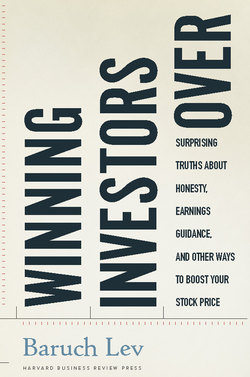Читать книгу Winning Investors Over - Baruch Lev - Страница 3
На сайте Литреса книга снята с продажи.
The Critical Role of Capital Markets
ОглавлениеI have recently analyzed, with a group of doctoral students, the detailed transcripts of hundreds of quarterly earnings conference calls of managers with investors and analysts. As this book unfolds, I will share with you what I learned from this fascinating, albeit laborious (that’s where the students come in handy), endeavor. One startling observation: with but one exception, all the conference calls, lasting about two hours each, were conducted by the CEO along with the CFO—sometimes with other executives present—and watched over, of course, by legal counsel. These are not special events, mind you. Conference calls, made soon after the release of quarterly results, have been, in recent years, routine events, yet the top corporate guns conducted them all.
Can you think of another corporate activity that is never delegated? Subordinates usually make crucial production, investment, marketing, or R&D decisions, and important relations with legislators and governmental institutions are often assigned to lobbyists. Talking to investors, in contrast, obviously cannot be entrusted to underlings. And, come to think of it, for good reason.
The capital markets arena is where the success or failure of public companies is largely determined: the company’s cost of capital—the all-important price and, often, the availability of external funds to finance investment and growth—is determined in the capital markets, based on the information available to investors.2 Share prices—the outcome of investors’ expectations and trades—directly affect managers’ compensation and increasingly their tenure: research consistently shows that poor share performance significantly increases the likelihood of top managers’ termination.3 Moreover, investor discontent, sparked by disappointing news and chronically depressed equity values, is the prime trigger for activist shareholders: Carl Icahn at Motorola, Nelson Peltz at Cadbury Schweppes, Eric Knight targeting HSBC Bank, Steel Partners at Japanese beer maker Sapporo, Ralph Whitworth at Sprint Nextel, and CalPERS, the giant California pension fund targeting multiple companies each year, are but a few examples of shareholder activists intruding in recent years on managerial turf, primarily because of share underperformance.4 And when investor discontent persists, a takeover and managerial overhaul ensues. Not the least of the adverse consequences of dropping stock prices are the consequent class-action lawsuits filed against managers and board members. All serious consequences indeed.
Less appreciated, yet equally important is the fact that share price patterns—growth or decline—are a beacon for highly qualified employees to join, stay, or leave the organization. The “war for talent” is fought partially with stock. Google’s spectacular stock price rise from 2005 to 2007 facilitated its raids on top software engineers and programmers employed by stock-price-lagging technology companies, including mighty Microsoft and Intel, while Google’s subsequent price decline from 2008 to 2009 contributed to its own brain drain. And Morgan Stanley’s mediocre performance from 2004 to 2005 was a major reason for the defection of top banking talent to competitors.
While capital markets affect the fortunes of all public enterprises, they are most crucial to the survival and growth of “equity-dependent companies,” those young, small and midsize, earnings- and cash-flow-starved businesses that nevertheless have attractive investment opportunities. These are high-tech, biotech, Internet–based, and health-care companies, as well as entrepreneurial transportation, telecommunications, and energy companies. They all rely on capital markets to fund their investment and growth.5 Downcast investors’ perceptions and lethargic stock performance are particularly damaging to these companies, which are vital to the nation’s economic growth.
No company is immune to the vagaries of the capital market. Even if it doesn’t rely on the stock market for continuous fund-raising—having no plans for stock or bond issues in the foreseeable future—the performance of the company’s shares, lagging or leading comparable firms, is an influential operating and solvency signal to lenders, suppliers, and customers, affecting their relations with the company. Suppliers are known, for example, to restrict sales and credit to retailers with depressed share prices. No wonder, then, that interaction with investors, such as in conference calls, is invariably conducted by the Cs: CEO and CFO.
